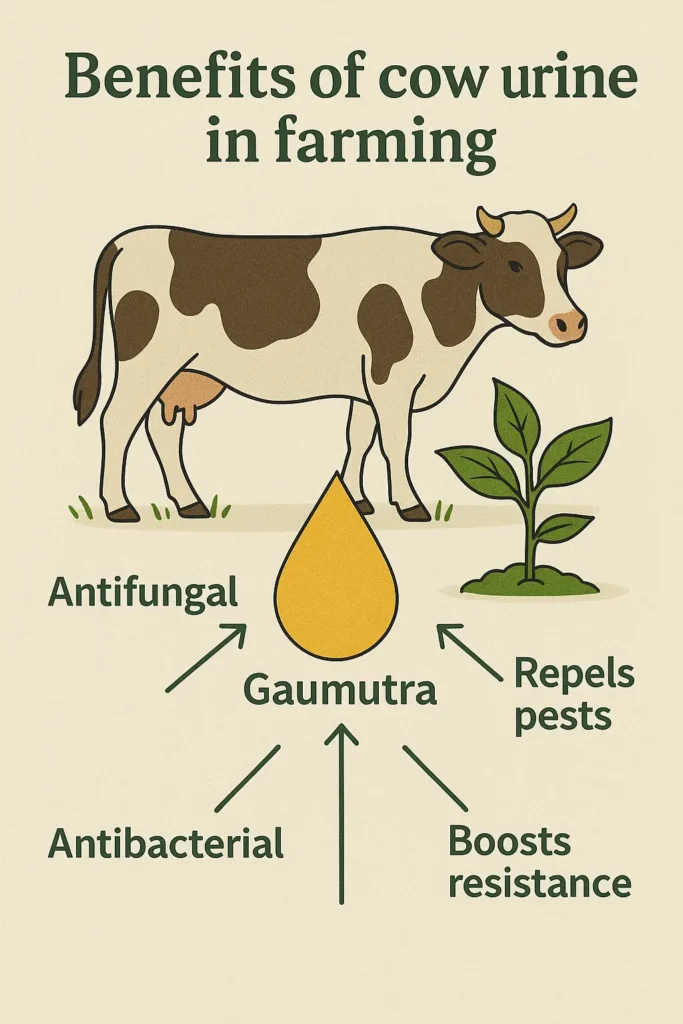
Can Cow Urine Really Save Your Crops from Pests?
So, this happened in a small village — Ramu, a farmer I know, was really struggling. Brinjal crop was full of pests. He’d already tried some sprays, spent money, still no result. And then someone—maybe his father or dadi, I forget—told him to use cow urine. Yeah, gaumutra.
Honestly, he did not believe it. Who would, right? But still… he tried it. Mixed it, sprayed it, waited. Within a week or so, he noticed fewer bugs. Then more plants started bouncing back. No chemical, no side effect. Just that one thing.
That’s when he realized — maybe these old tricks were not just superstition. Maybe cow urine for pest control actually works.
What Is Cow Urine, and How Does It Help?

Cow urine, often referred to as “gomutra” in Hindi, has been used in traditional Indian medicine for centuries. Even my grandfather also uses cow dung and cow urine in crop field. It is not just some fancy solution, but surprisingly effective.
While it does not act like a chemical pesticide, it does something smarter—it keeps pests uncomfortable and boosts the plant’s own resistance. Thanks to its natural mix of ammonia and other stuff, it slows down fungal and bacterial attacks too.
Most farmers do not use it alone though—they mix it with neem, garlic, or even chilies. The result? A home-brewed spray that does not kill instantly, but it sure does protect without harming the soil or the food.
Cow Urine as a Natural Pesticide
Honestly, farmers have been using cow urine for years — not because it’s trendy, but because it works. No chemicals, no fuss. It’s got this strong smell and natural kick that makes pests back off. Plus, it does not mess with the good bugs or poison the soil. Simple, cheap, desi solution.
Cow Urine and Soil Health
The funny thing is — it helps the soil too. Not just scaring off insects. It feeds the soil, boosts life underneath, and plants start looking more alive. A few farmers I know even said their crops bounced back better than before. It’s like giving your farm a natural energy drink.
You can follow my article on regenerative agriculture for restore soil health.

What Research and Science Say About Cow Urine
Talk to farmers or read the research—cow urine works. Its sharp smell, enzymes, and natural compounds confuse pests, fight disease, and even boost soil health without needing chemicals.
Scientific explanation and data
- ICAR Findings: Mixing cow urine with neem has shown a 50% drop in pest attacks in vegetable crops.
- TNAU Study: In Tamil Nadu, farmers using fermented cow urine saw a 60% decline in fruit borers in okra.
- Research Gate (2018): It recognized fermented cow urine as a low-cost, eco-friendly option for smallholder farms.
How It Works:
- Ammonia in it repels pests like aphids and caterpillars.which results increase crop yields.
- Urea and enzymes fight off bacterial and fungal infections.
- It supplies NPK nutrients that naturally boost plant health.
How to Use Cow Urine for Pest Control

If you have ever talked to an old-school farmer—or even experimented on your own—you will know cow urine has been quietly doing the job long before chemical sprays became the norm. It’s cheap, easy to use, and when done right, works like a charm.
Making the Mix
Here’s what most experienced farmers do: take a litre of fresh cow urine (the fresher, the better) and mix it with about ten litres of water. This balance keeps it strong enough to scare off pests but gentle on the plants. Some folks let it sit for a day, so it ferments slightly, which actually seems to make it even more effective.
Spraying It the Right Way
You do not need fancy tools. Just fill up a hand sprayer and go over the plants—top and bottom of the leaves especially, because that’s where bugs love to hide. A light, even mist is enough. Don’t drown the plant.
Now, if pests are hanging around the roots or crawling in the soil, you can pour the same diluted mix around the base. Think of it as feeding the soil while protecting your crop.
When Should You Apply?
There’s no hard rule, but most farmers go for once every 7 to 10 days. If the weather’s rough—like after rains or during peak pest seasons—you might want to spray a bit more often. Watch your crops. They will tell you what they need.
A Few Practical Tips
- Always go for fresh cow urine. The newer, the better.
- Never use it raw dilution is key. Straight urine can burn your plants.
- Want better results? Mix in a bit of neem extract or crushed garlic. It gives the pests a stronger reason to stay away.
- Best time to spray? Early morning or evening, when the sun’s not too harsh.
- Lastly, observe your plants. Some might love it. Others might need a tweak. Farming isn’t one-size-fits-all.
This is not theory from a lab—it is hands-on advice from real farms. Try it once, and you’ll see why so many are going back to basics.
How to Make Cow Urine Pest Spray or Pesticide for 1 Acre

If you have ever spent time with old-school farmers, you have likely heard them talk about using cow urine to protect crops. Sounds strange at first, but on real Indian farms, it is a tried-and-tested method that works when done properly. Here is how to make this spray, step by step — no technical talk, no fluff.
- Start with 10 litres of fresh cow urine, ideally collected early morning. Native breeds like Sahiwal or Gir are best, as their diet boosts the urine’s effectiveness. Always use it fresh—once it sits too long, it loses its power.
- Next, take 1 kg of neem leaves. Rinse them and crush gently—just enough to release the juices. Neem helps fight off sucking pests and fungi naturally.
- Add 50 grams of garlic, roughly crushed. The strong smell chases away bugs like aphids and whiteflies.
- Then mix in 3–4 green chillies (or 10g of red chilli powder). Crush the chillies a bit—they’re excellent for irritating pests without harming plants.
- Add 1 litre of clean water to blend it all. Avoid metal containers—use plastic or earthen pots. Stir with a wooden stick, not your hands.
- Cover the container with a cloth and let it sit in a shaded spot for 3–5 days. Stir once or twice daily. It’ll start smelling sharp—that means it’s fermenting well.
- After 5 days, strain it using a cloth. Before spraying, dilute the mix: 1 part solution to 10 parts waters. For a 15L tank, mix 1.5L solution with 13.5L water.
That’s it—no chemicals, no nonsense. Just a desi hack that works. Try it once, and your crops (and your wallet) will thank you.
Case study with cow urine: Ramesh Bhai from Gujarat

Let’s talk about Ramesh Patel, a cotton farmer from Gujarat. Like many others, he used to spend thousands on chemical pesticides, but despite the costs, pink bollworm was eating into his cotton crops every season.
In 2022, he gave the gaumutra solution a shot. His mix was simple:
he uses mostly following ingredeints like
1. 10 liters of fresh cow urine
2. Neem leaf paste
3.Garlic and green chili extract
He fermented the mixture for a few days and sprayed it weekly. The results were actually worked and here is how things turned out:
- Bollworm infestation dropped dramatically after 10–12 days.
- he claimed to be saved ₹10,000 on pesticide costs.
- Yield improved by 15% compared to last year.
- Best part? No harm to the soil, bees, or other helpful insects.
Now, Ramesh doesn’t just keep this trick to himself—he shares it with over 50 farmers in his Farmer Producer Organization (FPO) every year.
Conclusion: Embrace the Power of Nature
While modern farming throws us big promises in shiny packets, sometimes the best solutions come from what our elders quietly practiced for generations and try to pass one generation to next.
Cow urine, neem, garlic—these aren’t just desi hacks; they are tried and tested ways to protect crops without harming the soil or health. It reminds me of the same quiet magic in leguminous crops—how they fix nitrogen naturally, asking for nothing in return, yet giving so much.
If we can trust nature to nurture, maybe it’s time to bring that trust back into our fields.
If you haven’t yet, read my article on how leguminous crops fix nitrogen naturally—it might just change how you see your soil.
Let’s share and revive these age-old gems, one farm at a time. 🌱
Tried something similar? Comment below—I’d love to hear your story. and follow Agriverses.
Smart farming starts with going back to our roots. 🌱
FAQs: All About Using Cow Urine in Farming
Can cow urine replace chemical pesticides completely?
Cow urine works well for mild to moderate pest issues. For severe infestations, it’s best combined with natural allies like neem oil, garlic spray, or pheromone traps to boost effectiveness.
Is cow urine safe for all types of crops?
Yes—when diluted properly, it’s safe for most crops including vegetables, cereals, and pulses. But always test on a small patch first. Overuse or improper dilution can damage plants.
Will cow urine harm beneficial insects like bees and ladybugs?
Not at all. Cow urine mainly targets soft-bodied pests and has minimal impact on helpful insects, making it eco-friendly and pollinator-safe.
What’s better—fresh or fermented cow urine?
Fermented cow urine is more effective. It has reduced ammonia levels, enhanced microbial activity, and acts as a stronger pest repellent. Adding aloe vera boosts its antifungal power too.
Can I use cow urine in drip irrigation?
Not recommended. It may clog the system due to organic residues. Stick to foliar spray for best results and even coverage.
Can cow urine harm plants if used incorrectly?
Yes, it can. Undiluted or overly concentrated cow urine may burn plant leaves or damage roots due to its high nitrogen and ammonia content. Always dilute it properly—usually in a 1:10 ratio with water—and avoid spraying during hot afternoons. Testing on a small patch first is a smart way to prevent damage.







One Comment